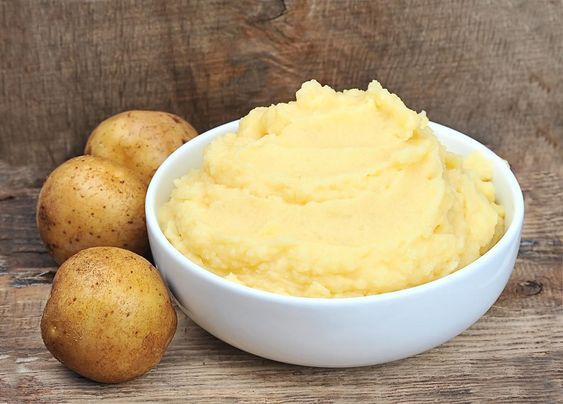How to Thicken Mashed Potatoes
There are a couple of ways to tackle runny mashed potatoes:
-
Thickeners: This is a common approach. You can use pantry staples like flour, cornstarch, or even powdered milk. Cornstarch is a great option because it’s gluten-free and thickens quickly. Just be sure to add it gradually, a tablespoon at a time, until your potatoes reach the desired consistency. Too much thickener can make your mashed potatoes gluey.
-
Reduce with heat: If you’re comfortable, you can try further cooking the potatoes to drive off excess moisture. Keep the pot on the stovetop with the lid off, and stir occasionally to prevent sticking. Be careful not to overdo it, though, or you’ll end up with gummy mashed potatoes.
Here are some other options you might find helpful:
-
Drain and steam: If your potatoes are particularly watery, you can try draining them in a colander for a few minutes to remove some of the excess liquid. Then return them to the pot and mash with a little heat to steam off any remaining moisture. Read about What is Sausage Made Of
-
More potatoes: If you have extra cooked potatoes on hand, you can simply mash them in with the runny batch to thicken things up.
-
Mashed potato flakes: In a pinch, you can use instant mashed potatoes to thicken your dish. Stir in a tablespoon of flakes at a time until you get the consistency you like. This won’t be a gourmet solution, but it can work in a fix.
Understanding Mashed Potatoes
Before we dive into the solutions, let’s get a grip on the basics. There are several types of potatoes, each bringing a unique texture to your dish. Russets are the go-to for their starchy, fluffy quality, while Yukon Golds offer a creamy, buttery texture. Your choice of potato can significantly impact the final consistency of your mashed potatoes.
The ideal texture for mashed potatoes is creamy yet firm enough to hold its shape. Too runny, and you lose that satisfying mouthfeel. Too thick, and they become dense and heavy. Striking the right balance is key.

Common Reasons for Runny Mashed Potatoes
Understanding why your mashed potatoes are runny is the first step to fixing them. Here are a few common culprits:
- Overcooking Potatoes: Potatoes absorb too much water when overcooked, leading to a watery mash.
- Adding Too Much Liquid: Whether it’s milk, cream, or broth, adding too much liquid can make your potatoes runny.
- Using the Wrong Type of Potatoes: Some potatoes are better suited for mashing than others. For instance, waxy potatoes like Red Bliss can yield a gluey texture if not handled properly. Discover about How Long to Steep Tea
Simple Fixes for Thickening Mashed Potatoes
Reducing Liquid Content
One of the easiest ways to thicken your mashed potatoes is to reduce the liquid content.
- Letting Excess Water Evaporate: After draining your potatoes, return them to the hot pot and let them sit on low heat. This allows any remaining water to evaporate.
- Draining Thoroughly: Ensure that your potatoes are well-drained after boiling. Even a little excess water can lead to a runny consistency.
Using Thickeners
When reducing liquid isn’t enough, thickeners can come to the rescue.
- Adding Potato Flakes: Instant potato flakes are a convenient option. Simply sprinkle them into your mash until you reach the desired consistency.
- Adding Instant Mashed Potato Mix: Similar to potato flakes, instant mashed potato mix can absorb excess liquid and thicken your potatoes quickly. Don’t Miss to Check Out Our Website: THEGENERAL FEED
Incorporating Dairy
Dairy products not only add creaminess but also help thicken mashed potatoes.
- Adding Cream Cheese: Cream cheese not only thickens but also adds a tangy flavor. Add a few tablespoons and mix well.
- Adding Sour Cream: Sour cream can also work wonders. It thickens the potatoes while giving them a rich, creamy taste.
Other Ingredients
For a more substantial thickening effect, consider these options:
- Using Cornstarch or Flour: Mix a small amount of cornstarch or flour with a little water to create a slurry, then stir it into your mashed potatoes. Cook for a few minutes to eliminate any raw taste.
- Adding Parmesan Cheese: Grated Parmesan not only thickens but also enhances the flavor. Stir in gradually until you reach the desired consistency.
Techniques to Avoid Runny Mashed Potatoes in the Future
Preventing runny mashed potatoes is all about technique and choice of ingredients.
- Cooking Potatoes Properly: Avoid overcooking your potatoes. They should be tender but not falling apart.
- Controlling the Liquid: Add liquid gradually. It’s easier to add more than to take away.
- Choosing the Right Potato: Stick to starchy potatoes like Russets or Yukon Golds for the best results.
Creative Variations for Thicker Mashed Potatoes
Herb-Infused Mashed Potatoes
Adding fresh herbs not only thickens your potatoes slightly but also adds a burst of flavor.
- Adding Fresh Herbs: Chop herbs like parsley, chives, or rosemary and fold them into your mashed potatoes. They can absorb some moisture and add a delightful aroma.
Garlic and Cheese Mashed Potatoes
For a richer, more indulgent side dish, try these variations.
- Incorporating Roasted Garlic: Roasted garlic adds a depth of flavor and can help thicken your mash. Simply mash the roasted cloves and mix them in.
- Mixing in Different Cheeses: Experiment with cheeses like cheddar, gouda, or blue cheese. They add creaminess and body to your mashed potatoes.

Tips for Serving and
Storing Mashed Potatoes
To keep your mashed potatoes perfect from stove to table, and even the next day, consider these tips:
- Keeping Mashed Potatoes Warm: Use a slow cooker on the warm setting or a double boiler to keep your mashed potatoes warm without drying them out.
- Reheating Leftovers: Reheat mashed potatoes gently, adding a bit of milk or cream to restore their creamy texture.
Conclusion
There you have it! With these tips and tricks, you’ll never have to suffer through runny mashed potatoes again. Whether you’re aiming for a simple thickening fix or experimenting with creative variations, there’s a solution for every potato predicament. So go ahead, make your mashed potatoes the star of your next meal!
FAQs
Can I use cold potatoes for mashing?
It’s best to use hot, freshly boiled potatoes for mashing. Cold potatoes can lead to a gummy texture.
How can I fix over-salted mashed potatoes?
Add more potatoes or a bit of cream to dilute the saltiness. You can also mix in some unsalted butter.
What’s the best way to reheat mashed potatoes without drying them out?
Reheat gently with a splash of milk or cream, either in a microwave or on the stove over low heat.
Are there any dairy-free options for thickening mashed potatoes?
Yes! You can use dairy-free milk and margarine, or thicken with vegetable broth and cornstarch.
Can I freeze mashed potatoes?
Absolutely. Just make sure they’re stored in an airtight container. When reheating, add a bit of liquid to restore the creamy texture.

Welcome to TheGeneralFeed.ca, where Lucas brings a fresh perspective to the world of news and information!
Lucas is a dynamic writer who is passionate about delivering compelling content that informs, engages, and inspires our readers. With a keen interest in a wide range of topics, including current events, technology, lifestyle, and more, Lucas keeps our audience informed and entertained with his insightful articles.




